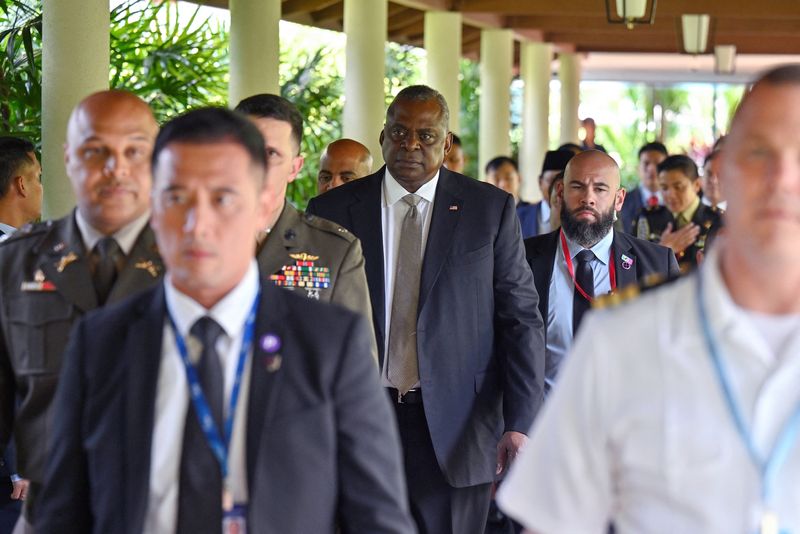Risk of military conflict between China and U. S. growing
2023.06.02 14:56

Risk of military conflict between China and U. S. growing
By Ray Johnson
Budrigannews.com – At a luxury hotel in Singapore on Friday, U.S. and Chinese military leaders smiled briefly and shaked hands, despite the deep freeze in communications that is causing the Pentagon more and more concern.
At the annual Shangri-La Dialogue, U.S. Defense Secretary Lloyd Austin sought a formal meeting with his Chinese counterpart, but Beijing refused. All things considered, the resigned U.S. Armed force general needed to make due with a fast trade at a supper in front of an end of the week brimming with gatherings among Asian military pioneers.
The awkward encounter is just one more example of the troubling gap between how the United States and China view military risks, according to officials and analysts. The United States wants deeper and more frequent military communications, while China is reluctant to get involved.
Relations between the superpowers are progressively bitter, with grating over issues from Taiwan and China’s tactical movement in the South China Ocean to U.S. endeavors to keep down China’s semiconductor industry.
As a response, the U.S. military has advocated for a long time for open lines of communication with their Chinese counterparts at both senior and working levels to reduce the likelihood of escalating tensions.
In contrast, during times of diplomatic tension, China’s leaders have been quick to terminate military contacts and slow to establish new ones. According to U.S. officials, the phone lines went silent after the United States shot down an alleged Chinese spy balloon earlier this year.
The United States has been frustrated by this.
Ely Ratner, the U.S. assistant secretary of defense for the Indo-Pacific, said at an event last week, “We have had a lot of difficulty in terms of when we have proposed phone calls, proposed meetings, and dialogues.” She was speaking about this during her speech.
“We have yet to have a consistently willing partner on this question of military-to-military engagement,” the statement reads.
Risks and benefits China had a good reason to stop Austin from meeting with Li Shangfu, the country’s Minister of National Defense: Li has been under U.S. sanctions starting around 2018 over the acquisition of battle airplane and hardware from Russia’s fundamental arms exporter.
According to Zhu Feng, dean of Nanjing University’s School of International Studies, Beijing believes that the sanctions placed on Li demonstrate that the United States is not sincere in its efforts to communicate with China.
“We think dialogue must be on equal terms,” Zhu stated, “the main reason why China is reluctant to have its defense minister meet with the United States.”
However, analysts assert that this is influenced by a variety of other factors, such as divergent approaches to negotiation and a divergent assessment of the risks and benefits.
China believes that the United States military is operating within its sphere of influence, including in the South China Sea and around Taiwan, despite the fact that neither nation wishes for an accidental military conflict.
According to Jacob Stokes, a senior fellow at the Center for a New American Security, China’s leaders do not believe it is in their best interest to use military talks to lessen American concerns.
He stated, “China wants the United States of America and its partners to feel worried about the rising military and security risks in East Asia, and then Washington should change its operational behavior to something Beijing views as less threatening.”
The Stimson Center’s director of the China program, Yun Sun, adds that China also sees fewer risks than the United States does.
“The Chinese don’t quite see the danger of getting into a military conflict with the United States as significant, especially given the ongoing war in Ukraine. Sun stated, “They would have a different attitude toward the mil-to-mil dialogue if they believed the threat to be greater.”
Then there is China’s perspective on how military talks fit into the larger relationship between the United States and China. The US might need to keep security-related conversations on a different track, however Chinese pioneers would prefer to maintain the emphasis on exchange and financial issues. According to that point of view, military discussions are something to deal with.
Daniel Russel, the top diplomat for East Asia under Obama and now with the Asia Society Policy Institute, stated, “Beijing is clearly favoring the economic relationship with American business and government over the more contentious political and defense channels.”
A U.S. official said on Friday that CIA director William Burns visited China last month and met with Chinese counterparts to stress “the importance of maintaining open lines of communication in intelligence channels.”
After colliding with a Chinese fighter jet in 2001, a U.S. spy plane made an emergency landing on the island of Hainan.
One Chinese pilot passed on and Beijing kept the 24-part U.S. team for 11 days, delivering them solely after Washington sent a letter saying it was “exceptionally heartbroken.”
On the condition of anonymity, a senior U.S. defense official stated that China had declined or failed to respond to more than a dozen requests to speak with the Pentagon and nearly ten requests for working-level engagement since 2021.
One official stated, without providing additional details, that Beijing’s response is “no,” similar to the most recent denial.
The senior U.S. official stated, “Frankly, it’s just the latest in a litany of excuses.”








